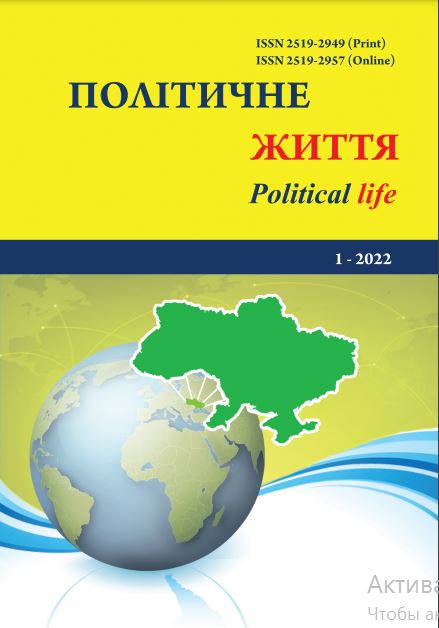Analysis of the Kremlin Propaganda Hidden Topics in Ukraine
DOI:
https://doi.org/10.31558/2519-2949.2022.1.19Keywords:
hybrid warfare of the Russian Federation in Ukraine; propaganda; RT; analytical reports; structural thematic analysis; thematic modeling; STM (Structural Topic Model)Abstract
Propaganda is one of the defining components of Russia’s security policy. In order to understand the intentions and specific goals of propaganda, it is important to identify the thematic structure of propaganda messages.
The study is devoted to the analysis of the thematic structure of analytical reports on the website of the RF network of information channels RT in a certain period of Russia’s hybrid warfare against Ukraine (namely, from September 2018 to April 2020). Thematic modeling based on STM model makes the research methodological basis.
The results of the study have made it possible to identify at least 12 hidden topics that do not intersect in content and are easy to be interpreted unambiguously and clearly. For each of them the list of the most probable topics outlining words is defined. The range of topics covers both exclusively domestic issues, problems, and Ukraine’s relations with Russia and its western neighbors.
The most frequently used methods of presenting thematic material have been singled out, specifically, the use of "long-playing record", "linking" topics to specific events or the context of individual messages / set of messages, updating old messages in a new context, etc. The analysis has enabled to identify a thematic network of topics that appear in one document, or documents close in time, thus increasing the overall impact on the audience. The same effect is achieved through the alternate use of mono-topic and multi-topic documents. The analysis of propaganda messages in the time-thematic dimension is also important. It is shown that in the researched period in terms of content and goals of propaganda two periods are clearly distinguished, i.e., the period of P. Poroshenko’s Presidency and the period of V. Zelensky’s Presidency, each can also be divided into two subperiods with their characteristic messages. However, despite their differences, the thematic constant remains, that is the discrediting of politicians, experts, the country’s Armed Forces, and the imposition of a one-sided pro-Russian worldview on the target audience.
References
Білик Д. Як пропаганда Кремля впливає на роботу німецьких журналістів. Deutche Welle, April 1, 2015. URL: https://www.dw.com/uk
Как Кремль строит медиаконгломерат и пытается втянуть страны мира в инфопространство РФ. GUILDHALL, May 15, 2020. URL: https://ghall.com.ua/2020/05/15/kak-kreml-stroit-mediakonglomerat-i-pytaetsyavtyanut-strany-mira-v-infoprostranstvo-rf/.
Background to “Assessing Russian Activities and Intentions in Recent US Elections”: The Analytic Process and Cyber Incident Attribution. Intelligence Community Assessment, 2017. URL: https://www.dni.gov/files/documents/ICA_2017_01.pdf
Elswah M., Howard Ph. N. “Anything that Causes Chaos”: The Organizational Behavior of RussiaToday (RT). Journal of Communication, Vol. 70, Issue 5, October, 2020, pp. 623–645. URL: https://academic.oup.com/joc/article/70/5/623/5912109
EU strategic communication to counteract anti-EU propaganda by third parties. European Parliament resolution of 23 November 2016 on EU strategic communication to counteract propaganda against it by third parties (2016/2030(INI)). URL: https://www.europarl.europa.eu/doceo/document/TA-8-2016-0441_EN.pdf?redirect
Gerbner G., Gross L., Morgan M., & Signorielli N. Living with television: The dynamics of the cultivation process. Perspectives on media effects, J. Bryant & D. Zillman (Eds.). Hilldale, NJ: Lawrence Erlbaum Associates, 1986, pp. 17-40.
Goffman E. Frame Analysis: An Essay on the Organization of Experience. New York, NY et al.: Harper & Row, 1974.
Hovland C. I., Janis I. L. (eds.). Personality and Persuasibility. New Heaven: Yale University Press, 1959.
Katz E., Blumler J. G.and Gurevitch M. Uses and Gratifications Research. Public Opinion Quarterly, Vol. 37, № 4(Winter 1973–1974), pp. 509-23. Published By: Oxford University Press, 2011. URL: http://jstor.org/stable/2747854.
Lasswell H. D. Propaganda Technique in the World War. New York: Peter Smith, 1927 328 p. URL: https://babel.hathitrust.org/cgi/pt?id=mdp.39015000379902&view=1up&seq=13
Meister S. (ed.). Understanding Russian Communication Strategy: Case Studies of Serbia and Estonia. Stuttgart: ifa (Institut für Auslandsbeziehungen), 2018. URL: https://www.ssoar.info/ssoar/bitstream/handle/ document/59979/ssoar-2018-meister-Understanding_Russian_Communication_Strategy_Case.pdf
Noelle-Neumann E. Turbulences in the climate of opinion: Methodological applications of the spiral of silence theory, Public Opinion Quarterly, 41 (2), 1977, pp. 143–58.
Reynolds L. T., Herman-Kinney N. J. Handbook of Symbolic Interactionism. Walnut Creek, Calif.: AltaMira Press, (1958(2003)).
Roberts M. E., Stewart B. M., Tingley D., et al. Structural topic models for open-ended survey responses. American Journal of Political Science, 58(4), 2014, pp. 1064–1082. URL: https://scholar.harvard.edu/files/dtingley/files/topicmodelsopenendedexperiments.pdf
Roberts M. E., Stewart B. M., Tingley D. stm: R package for structural topic models. Journal of Statistical Software, 10(2), 2014a, pp. 1–40. URL: https://www.jstatsoft.org/article/view/v091i02
Roberts, Margaret E., Stewart, Brandon M., Airoldi, Edoardo M. A model of text for experimentation in the social sciences. Journal of the American Statistical Association, 111(515), 2016, pp. 988–1003. URL: https://www.tandfonline.com/doi/abs/10.1080/01621459.2016.1141684?journalCode=uasa20
Rogers E., Wdearing J. Agenda-setting research: Where has it been, where is it going?. Communication Yearbook, 11, 1988, pp. 555–594.
Rose M., Dyomkin D. Macron denounces “lying propaganda” of Russian media as he meets Putin. The Independent, May 29, 2017. URL: https://www.independent.co.uk/news/world/europe/vladimir-putin-emmanuelmacron-election-hacking-lying-propaganda-meeting-a7762336.html
Waterson, J. RT fined ₤200,000 for breaching impartiality rules. The Guardian, July 26, 2019. URL: https://www.theguardian.com/media/2019/jul/26/rt-finedbreaching-impartiality-rules-ofcom
Yuskiv B., Karpchuk N. Dominating Concepts of Russian Federation Propaganda Against Ukraine (Content and Collocation Analyses of Russia Today). Politologija, 2021, № 102, Issue 2, 2021, pр. 116-152. URL: https://www.journals.vu.lt/politologija/article/view/24506

